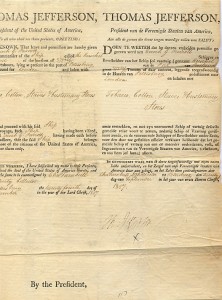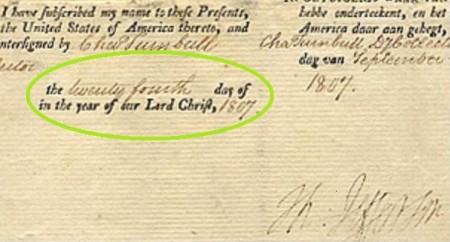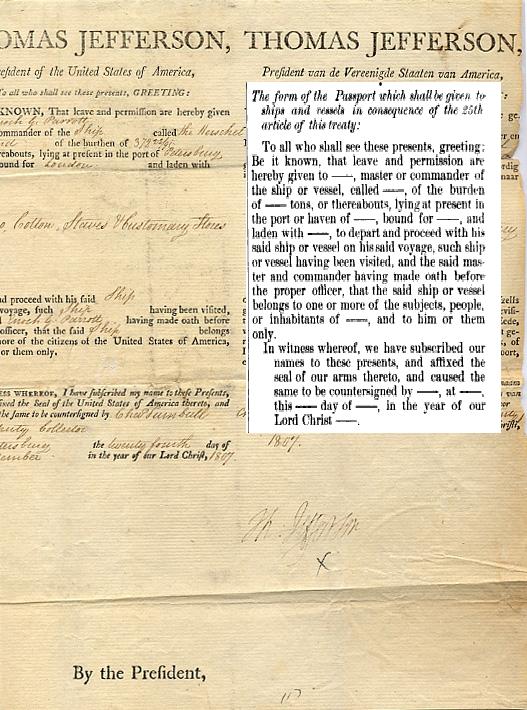Yesterday, I addressed David Barton’s claim that Thomas Jefferson authorized funds to evangelize the Kaskaskia Indian tribe. What he actually did was sign a treaty which provided funds to the tribe to help build a church and help fund the services of a Catholic priest for a brief period. The 200 or  so Kaskaskia Indians were already predominantly Catholic and the funds amounted to part of a transaction in exchange for their land.
so Kaskaskia Indians were already predominantly Catholic and the funds amounted to part of a transaction in exchange for their land.
Today, I want to examine the claim by David Barton that Thomas Jefferson was so religious that he included mention of Jesus as Christ in government documents. Specifically, Barton points to the document to the left and says there is significance in the phrase, “In the Year of Our Lord Christ.” (click the image to enlarge it)
On his Wallbuilders site, Barton explains what he sees as the significance of the appellation:
Following is an original document in our possession, signed by Thomas Jefferson on September 24, 1807. This document is permission for a ship called the Herschel to proceed on its journey to the port of London. The interesting characteristic of this document is the use of the phrase “in the year of our Lord Christ.” Many official documents say “in the year of our Lord,” but we have found very few that include the word “Christ.” However, this is the explicitly Christian language that President Thomas Jefferson chose to use in official public presidential documents.
You can click the document to see the portion Barton has placed on his website. The English part is not completely visible, while the Dutch component is. I have enlarged the section which contains the phrase in question.

Jefferson did indeed sign this sea letter allowing safe passage for the Herschel to travel to London. However, Jefferson did not choose the “explicitly Christian language” in this document.
As is obvious from the document, this is a form which was preprinted with writing added based on the specific situation. This particular form was required by the Treaty with Holland of 1782 to be used as a kind of passport – called a sea letter – to allow safe passage of ships from an American port to the port of an enemy; more about that to come. See the image below which describes the form as the “form of the Passport which shall be given to ships and vessels in consequence of the 25th article of this treaty:”
This particular image comes from a book titled Reports of Cases Argued and Decided by the United States Supreme Court, compiled by a New York lawyers group in 1882. The treaty referred to here was signed with Holland in 1782, the same year Holland became the second nation, after the French, to recognize the independence of the fledgling United States. England had declared war with Holland in 1780.
By 1807, Holland was essentially controlled by the French who were at war with England. For an American ship to sail to London, the sea letter displayed by Barton was necessary for safe passage. The treaty specified that
Art. 10. The merchant ships of either of the parties, coming from the port of an enemy, or from their own, or a neutral port, may navigate freely towards any port of an enemy of the other ally; thev shall be, nevertheless, held, whenever” it shall be required, to exhibit, as well upon the high seas as in the ports, their sea-letters and other documents, described in the twenty-fifth article, stating expressly, that their effects are not of the number of those which are prohibited, as contraband: and not 35*] *having any contraband goods for an enemy’s port, they may freely, and without hindrance, pursue their voyage toward the port of an enemy. Nevertheless, it shall not be required to examine the papers of vessels convoyed by vessels of war, but credence shall be given to the word of the officer who shall conduct the convoy.
Art. 11. If, by exhibiting the sea-letters, and other documents, described more particularly in the twenty-fifth article of this treaty… (my emphasis)
Note the phrases in bold print. When moving toward the port of an enemy, the ship was to have a sea letter. The form of the sea letter was prescribed by treaty to contain the language it did. Now compare the Herschel sea letter with the form prescribed by treaty in the image below:

The language is the same. Jefferson was bound by treaty to use this form and did not choose to use this “explicitly Christian language.” John Adams is credited with negotiating the treaty but given the frequency of the phrase in other French treaties and documents of the era, my assumption is that the language was considered standard. Many early Canadian documents also used the phrase, but I doubt Mr. Barton would make the same religious attributions to the signers of those documents that he does in the case of Jefferson.
Next: Did Jefferson approve church services in the Capitol and order the Marine Band to play for them?
Related:
David Barton on Thomas Jefferson – Gnadenhutten and the Christian Indians
David Barton on Thomas Jefferson – United Brethren and the Christian Indians
David Barton on Thomas Jefferson – In the Year of Our Lord Christ
David Barton on Thomas Jefferson: The Kaskaskia Indians
Was the Jefferson Bible an evangelism tool?
More on Thomas Jefferson and Christianity
David Barton: Pluralism not the goal of the First Amendment
Did the First Amendment Create a Christian Nation?
The real problem with the whole “year of our Lord” argument is that it completely ignores one key fact: that was simply the CONVENTION for stating the date in the Western World. Even today we use a date (2012) based on the assumed date of Jesus’ birth. (I say “assumed” because no one knows for sure it it’s the correct date.)
I assure you that although I sign my checks with “2012”, as a Jew I am most certainly NOT recognizing the birth of Jesus by doing so! Don’t asssume Jefferson was either. (Or any of the other Founders for that matter.)
I`m going to side with David Barton on this. Most scholars believe that Jefferson along with the other founding fathers were either deists or even atheists, which is far from the truth. Jefferson was very much a Christian… as were the others.
Joe – Would a Christian say this?:
Would a Christian take scissors to the Bible and cut out the virgin birth and the resurrection as a means of demonstrating the real teachings of Jesus?
Click the link to read the words highlighted in yellow and ask yourself if a real Christian would say those things.
Anything read on the Wallbuilders website must be checked thoroughly. I suspect there is some truth there, but so far the claims about Jefferson and Adams I have looked into have not been accurate.
The real problem with the whole “year of our Lord” argument is that it completely ignores one key fact: that was simply the CONVENTION for stating the date in the Western World. Even today we use a date (2012) based on the assumed date of Jesus’ birth. (I say “assumed” because no one knows for sure it it’s the correct date.)
I assure you that although I sign my checks with “2012”, as a Jew I am most certainly NOT recognizing the birth of Jesus by doing so! Don’t asssume Jefferson was either. (Or any of the other Founders for that matter.)
Agreeing with Warren, anyone who edits the bible “Jefferson Bible,” is not possibly a christian. There are of Evangelical pastors today that use Christ’s name, but are changing up the bible to make it more “contemporary” or palatable? The Bible is clear that any one who adds to or takes away from the bible shall be taken out of the book of life…Revelations 22.
Agreeing with Warren, anyone who edits the bible “Jefferson Bible,” is not possibly a christian. There are of Evangelical pastors today that use Christ’s name, but are changing up the bible to make it more “contemporary” or palatable? The Bible is clear that any one who adds to or takes away from the bible shall be taken out of the book of life…Revelations 22.
Joe – Would a Christian say this?:
Would a Christian take scissors to the Bible and cut out the virgin birth and the resurrection as a means of demonstrating the real teachings of Jesus?
Click the link to read the words highlighted in yellow and ask yourself if a real Christian would say those things.
Anything read on the Wallbuilders website must be checked thoroughly. I suspect there is some truth there, but so far the claims about Jefferson and Adams I have looked into have not been accurate.
I`m going to side with David Barton on this. Most scholars believe that Jefferson along with the other founding fathers were either deists or even atheists, which is far from the truth. Jefferson was very much a Christian… as were the others.
@kincaid
It appears you aren’t familiar with Barton. He does not do “debates” – he does not show up in unfriendly venues – and he doesn’t recant anything. If he sees the word “jesus” in anything – that proves in his eyes that document or the signer of that document is an evangelical and a servant of Christ.
In short – Barton is completely delusional.
@kincaid
It appears you aren’t familiar with Barton. He does not do “debates” – he does not show up in unfriendly venues – and he doesn’t recant anything. If he sees the word “jesus” in anything – that proves in his eyes that document or the signer of that document is an evangelical and a servant of Christ.
In short – Barton is completely delusional.
One half of me finds Barton hysterically amusing, and the other is disturbed by his delusions. It is a wonder how he continues to spin, and spin his web. Did he ever stop to think that some day he would get tangled in it?
One half of me finds Barton hysterically amusing, and the other is disturbed by his delusions. It is a wonder how he continues to spin, and spin his web. Did he ever stop to think that some day he would get tangled in it?
Timothy, even the pre-printed form with the phrase “our Lord Christ” on it (and T. Jefferson’s personal signature under that) works as an Aha, gotcha! rebuttal to crank(y) atheists like Michael Newdow — i.e., those who want any and all references to “God” removed from our currency and the Pledge of Allegiance, etc.
And I would venture to guess that some in Barton’s core audience believe that everyone who argues for strict church/state separation belongs to the same Sekrit Athiest Kabal as Michael Newdow.
It is difficult to imagine how Barton could possibly have looked at the above document, noted that part was preprinted and part in Jefferson’s hand, and reported what he reported. Try as one might, it is difficult to find an absence of intentional distortion in his claim.
Will he recant his position now that it has been proven to be false? Well, that depends on whether an honest portrayal of history is his goal.
Timothy, even the pre-printed form with the phrase “our Lord Christ” on it (and T. Jefferson’s personal signature under that) works as an Aha, gotcha! rebuttal to crank(y) atheists like Michael Newdow — i.e., those who want any and all references to “God” removed from our currency and the Pledge of Allegiance, etc.
And I would venture to guess that some in Barton’s core audience believe that everyone who argues for strict church/state separation belongs to the same Sekrit Athiest Kabal as Michael Newdow.
It is difficult to imagine how Barton could possibly have looked at the above document, noted that part was preprinted and part in Jefferson’s hand, and reported what he reported. Try as one might, it is difficult to find an absence of intentional distortion in his claim.
Will he recant his position now that it has been proven to be false? Well, that depends on whether an honest portrayal of history is his goal.